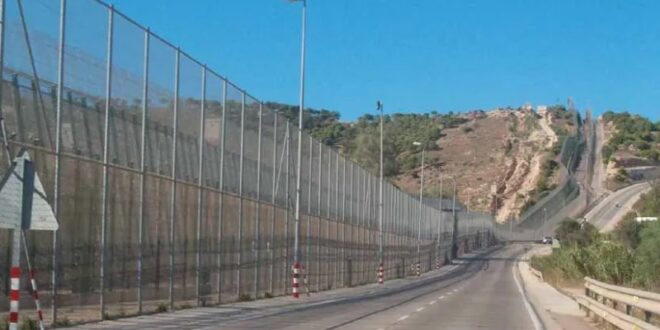On 24 June, around 2 000 sub-Saharan African migrants, who had gathered the night before in north-eastern Morocco, set off at dawn to cross the border and reach the Spanish city of Melilla, about 4 km away.
Many were reportedly armed with batons, rocks and knives. Moroccan riot police responded with brutal force, killing 37 migrants and wounding hundreds, according to several local non-governmental organisations (NGOs), including the Moroccan Association for Human Rights (AMDH).
The clash happened as the migrants reached the barbed wire fence surrounding Melilla. Moroccan authorities said the migrants had used violence while trying to reach their destination. But an AMDH spokesperson contested this, saying Moroccan police used disproportionate force, teargas and batons – all while Spanish police stood by. Wounded migrants lay unattended for nine hours before ambulances and rescue services arrived.
Even after the deaths, and the arrests of between 60 and 70 migrants, Moroccan police beat Sudanese and Nigerian migrants, who by then were no longer armed and were pleading for help. If the public was shocked by the images they saw, this wasn’t the case for international political and diplomatic communities. While acknowledging that the migrants had used violence, Melilla’s mayor Eduardo de Castro was among the few to denounce Morocco’s ‘disproportionate response.’
Wounded migrants lay unattended for nine hours before ambulances and rescue services arrived
This tragedy on Europe’s doorstep is reminiscent of a similar movement of migrants in May 2021 in Ceuta, another Spanish enclave north of Morocco. Morocco opened its borders to pressure Spain over the hospitalisation in that country of Sahrawi Arab Democratic Republic and Polisario Front leader Brahim Ghali. Roughly 8 000 migrants crossed to Ceuta.
The incident soured diplomatic relations between Rabat and Madrid, with the latter accusing Morocco of aggression. Since then, bilateral ties have resumed, even entering a honeymoon period after Spanish Prime Minister Pedro Sánchez unilaterally recognised Morocco’s authority over occupied Western Sahara on 18 March 2022. Morocco’s King Mohammed VI recently called on his country’s partners to clarify their stance on Western Sahara and offer their ‘unequivocal’ support to Morocco.
Rabat presents itself as the first African rampart against terrorism and illegal migration to Europe, playing the reliable ally card with the European Union (EU) and United States. As a result, tragedies such as in Melilla elicit little condemnation from the EU.
Morocco, aided by European funds, plays a big part in preventing African migrants from entering Europe. In return, Rabat is rewarded with silence in the face of disasters like Melilla or, as with Spain, recognition of Western Sahara’s occupation. Although he later backtracked, Sánchez even praised Spanish and Moroccan collaboration at the border, calling the migration attempt a ‘violent attack on the territorial integrity of our country,’ that was adequately handled.
Tragedies such as in Melilla elicit little condemnation from the EU and Morocco’s other allies
In its 26 June communiqué, African Union (AU) Commission Chairperson Moussa Faki Mahamat expressed ‘deep shock’ and called for an ‘immediate investigation into the matter.’ He reminded ‘all countries of their obligations under international law to treat all migrants with dignity.’
However, the AU didn’t condemn Morocco for what has been called a massacre. The continental body rarely speaks out about the actions of one of its member states, especially because Morocco, in this case, is one of the major financial contributors to the AU budget.
Two days after the 24 June tragedy, AMDH published an image showing Moroccan authorities digging what appeared to be 20 graves, believed to be for the migrants who died at the crossing. There are concerns that Moroccan authorities intend to bury the dead without investigation, autopsies and identification to cover up the disaster. On 25 June, nine Spanish and Moroccan NGOs – among them AMDH and the Moroccan Organisation Démocratique du Travail – called for an immediate judicial independent investigation.
Since the migrants gathered the day before the incident, Moroccan intelligence services must have known about the migrants’ preparations. Rabat regularly boasts about the professionalism and efficiency of its security services, which suggests they could have prevented the arrival of migrants at Melilla and the killings.
Morocco’s police could probably have prevented the migrants’ arrival at Melilla and the killings
Morocco is often presented as modern and progressive, especially compared to other countries in the Middle East and North Africa. International Organization for Migration Mission Head Laura Palatini declared last year: ‘Morocco is one of the few countries that stands as a model for managing immigration problems and the civilised treatment of foreigners, while offering a dignified life.’
This idealistic portrayal is misleading. Sean Yom, a specialist on regimes in the Middle East and Morocco, wrote in 2017 that Morocco ‘looks good only because the rest of the region looks so bad.’
‘Morocco appears as a promising reformer when compared to the Gulf monarchies – which include some of the world’s most closed and coercive dictatorships. When plucked from this context and analysed on its own terms, however, the regime trajectory of Morocco’s Alawite Dynasty does not look nearly so promising.’
Two deadly migrant crises involving the authorities have occurred in Morocco in just one year. In both cases, the migrants’ fate was ignored by Rabat’s European allies and partners.
As Le Monde pointed out during the Ceuta crisis, Rabat’s migration policy underlines that the country is an authoritarian regime that rules with an iron fist. In the wake of the Melilla massacre, it is surely ‘time for Western chancelleries – as well as the AU – to review their naivety’ towards Morocco, starting with sanctioning their close ally.
 Eurasia Press & News
Eurasia Press & News



